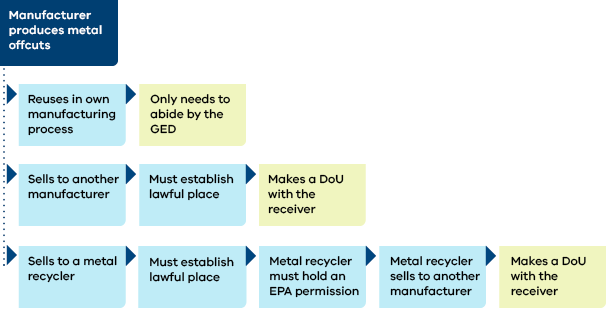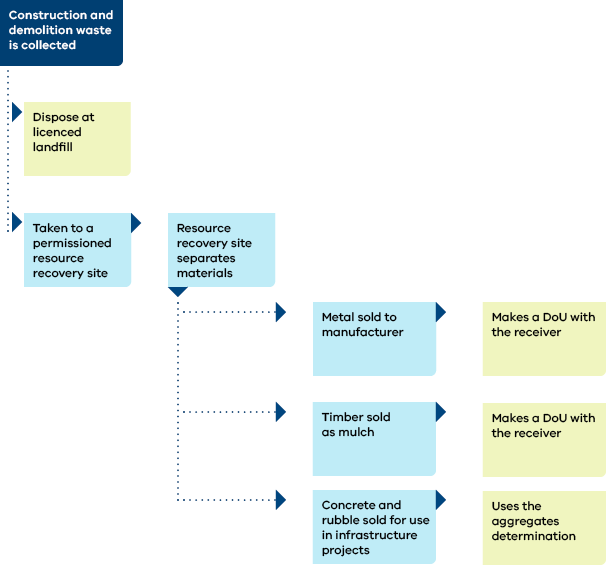A declaration of use (DoU) is a self-assessed agreement between a waste producer and waste receiver that enables the producer to deposit waste at a place authorised to receive it. This applies to all industrial waste, including waste intended for reuse or recovery.
A DoU supports the general environmental duty.
A DoU includes a declaration from both the producer and the receiver. The producer makes a declaration that:
- describes the waste
- identifies legitimate uses for it
- assesses its risks to human health and the environment
- provides the end user with details about the quality and safety of the waste.
The receiver declares that the place or premises at which the waste is to be received is suitable to use the waste. Both producer and receiver must sign the DoU.
Under regulation 64(3) of the Environment Protection Regulations 2021(opens in a new window), you cannot make a DoU if:
- your waste is reportable priority waste that needs a permission to transport
- you're receiving waste for a prescribed activity that needs a permission.
You do not need to make a DoU if a determination applies, such as for recycled aggregates or fill material.
When to make a DoU
A DoU is suitable for:
- industrial waste
- priority waste
- reportable priority waste that needs tracking only.
You can make a DoU when you intend to use the industrial waste immediately, without needing to process it further or store it. You can make a DoU for a limited range of wastes to be applied to land.
You can make a DoU for:
- immediate use of waste for resource recovery
- immediate use of waste other than soil as a substitute for an input or raw material in a commercial, industrial, trade or laboratory activity
- application of the following waste to land:
- commercial garden and landscaping organics that do not contain any physical or chemical contamination
- untreated timber, including sawdust
- natural organic fibrous waste.
Under the Environment Protection Act 2017(opens in a new window), resource recovery in relation to waste means:
- preparing the waste for reuse
- recycling the waste
- reprocessing the waste
- recovering energy or other resources from the waste
- any activity prescribed to be resource recovery in relation to waste.
Waste soil
A DoU can only be used for waste soil if:
- it is for immediate use for resource recovery
- the waste soil is not being applied to land.
Waste soil can be managed through a permission or a fill material determination. In most cases, a DoU is not suitable and is not needed for managing waste soil.
Requirements and conditions of a DoU
A DoU can only be made for:
- a one-off consignment of waste, or
- a specified period of time, up to 12 months.
For DoUs made for a specified period of time, you do not need a new DoU every time you produce or receive the same kind of waste.
We can impose conditions on a DoU by providing written notice to each person who made the declaration.
Keep a copy of the DoU
Both the producer and receiver must keep a copy of the completed and signed DoU for 2 years from the date on which it was made. Penalties apply for non-compliance.
An EPA authorised officer may ask to see your DoU.
Notify of change in circumstances
If, after signing the DoU, you become aware of any change in circumstance that makes the DoU inaccurate, you must notify the other signed party of the change as soon as practicable. You will need to complete a new DoU form.
Penalties apply for non-compliance.
Revoke a DoU
We can provide written notice to each person who made the declaration to revoke (cancel) a DoU.
A DoU has no effect from the time we provide a written notice that it is revoked.
How to make a DoU
There are 2 options for making a DoU:
- complete our Declaration of Use form
- develop your own DoU form following the requirements detailed below.
Our form is designed to support you to make a DoU in a broad range of circumstances. In some circumstances, you may prefer to develop your own form. You do not need our approval to use your own form.
Develop your own DoU form
You must include the information below in your form to meet the requirements of regulation 64 of the Environment Protection Regulations and our compliance and enforcement requirements.
Both the parties entering into the agreement must sign the form.
Refer to our Declaration of Use form for more detail on the information you must provide.
| Information to provide | Includes |
| producer contact details |
|
| receiver contact details |
|
| intended use | Set out the circumstances for which you're making a DoU. Refer to [DoU requirements]. |
| type of waste | The producer must declare the type of waste that is being used. |
| risks of harm | The producer must declare any risks of harm to human health or the environment that exist in relation to using the waste. |
| minimising risk | The producer must declare how to minimise those risks of harm so far as reasonably practicable. |
| place authorised to receive the waste | The receiver must declare that the place or premises at which the waste is to be received is suitable to use the waste. |
| consignment period | Set out if the DoU is for a specific consignment of industrial waste or for a specified period of time, up to a maximum of 12 months. |
| producer signature | The producer must sign the DoU to make the declaration. |
| receiver signature | The receiver must sign the DoU to make the declaration. |
Examples of DoUs
A DoU is only suitable for certain circumstances. Below are 3 examples of when a DoU may apply.
Bike manufacturer produces scrap metal waste
Option 1
Offcuts are reused by the manufacturer in their own manufacturing process.
No DoU is required. The manufacturer only needs to meet the general environmental duty.
Option 2
Offcuts are sold to another manufacturer (the receiver) as a replacement for virgin material.
The manufacturer must establish that the receiver is authorised to receive the offcuts. The manufacturer makes a DoU with the receiver.
Option 3
Offcuts are sold to a metal recycler. The manufacturer:
- must establish that the metal recycler is authorised to receive the offcuts
- must ensure that the metal recycler has a permission from us.
The metal recycler:
- sells the offcuts on to a manufacturer as a replacement for virgin material
- must make a DoU with the receiving manufacturer to ensure they are authorised to receive the offcuts.
Skip bin operator collects construction and demolition waste
Option 1
Waste is disposed of at a licensed landfill.
Option 2
Waste is taken to a permissioned resource recovery site for processing.
Resource recovery site separates received construction and demolition waste
Option 1
Metals are sold to a manufacturer as a replacement for virgin material.
A DoU with the manufacturer is needed.
Option 2
Untreated timber is shredded and used as mulch by a landscaper.
A DoU with the landscaper is needed.
Option 3
Concrete is sold for use in infrastructure projects.
No DoU is needed. The concrete is being used in accordance with the recycled aggregates determination.
Updated



